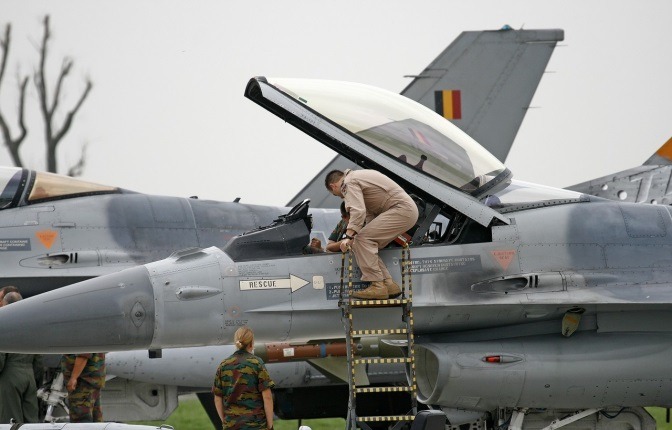Europe’s defence policy, long overshadowed in favour of its economic initiatives, has been in the spotlight for the past month. Sunday night in Berlin, French President Emmanuel Macron reiterated his calls for Europe to “take more responsibility for its defence and security”. Macron’s vision of a sovereign Europe as the guarantor of global peace may have gained traction with the German chancellor, but has decidedly ruffled feathers in Washington, earning some irate tweets from Donald Trump.
Macron’s dream of a pan-European defence was struck a harsh blow last month when Belgium decided to hand a multibillion-dollar contract for new fighter planes to Lockheed Martin, preferring the American company’s F-35 stealth jets to the Eurofighter Typhoon, a war plane developed by Italy, Germany, the U.K. and Spain.
Brussels’s decision was met with disappointment from European firms and policymakers alike. Airbus called Belgium’s selection of Lockheed Martin “a lost opportunity to strengthen European industrial cooperation in times when the EU is called upon to increase its joint defence efforts”, while Macron remarked that “strategically it goes against European interests”.
The Belgian government has offered a simple rationale behind its decision—Prime Minister Charles Michel explained when announcing the deal that, much as his government had wanted to support its European allies, choosing the F-35 over the Eurofighter brought Belgium €600 million in savings.
Other Belgian officials, however, have continued to raise concerns over the procedure by which the tender was awarded to Lockheed Martin for the new fighter jets. A plenary session in the Belgian Chamber of Representatives on October 24th saw members of Parliament from across the political spectrum raising concerns about the objectivity and even legality of the tender.
A point of particular concern for some MPs was the extent to which Simon Put, who served as the deputy chief of staff to Belgian defence minister Steven Vandeput until December 2017, was involved in the tendering process. Put was fired after the defence minister found out that he had contact with Lockheed Martin which Vandeput felt could cast doubt on the ongoing tendering procedure. The American firm hired Put shortly after his dismissal as Western Europe Country Manger, in charge of sales to Belgium, France and the Netherlands.
The amount of influence Put had over the tendering process for the fighter planes has been the subject of much debate in the Belgian parliament. Defence minister Vandeput has insisted that an audit had shown that Put had not had access to sensitive information regarding the candidates, but acknowledged that Put had not declared his involvement in the tender process as he was required to.
MPs also questioned at which point the former deputy chief of staff first entered into contact with Lockheed Martin; while Put did not start working for his new employer until January 2018, representative Tim Vandenput pointed to a photo published online showing “Mr. Simon Put of the Belgian government” visiting the facility where Lockheed Martin manufactures its F-35 planes. The defence minister admitted that the photo had been taken before Put had even started working in his cabinet, but refuted MPs’ concerns that this implied that Put was already working for Lockheed Martin at the time the photo was taken.
Given that Lockheed Martin did not submit its final bid until 14 February 2018, one month after Simon Put began working for the firm, pinning down the time at which Put began to have a professional relationship with Lockheed Martin could help MPs narrow down the time window during which Put could theoretically have looked into the details of competing bids.
In parliament, defence minister Vandeput adamantly insisted that an external investigation had proven that Put did not transmit any sensitive information to Lockheed Martin which could have given the American firm an unfair advantage in the tendering process. MPs nevertheless suggested that Put’s nebulous connections to Lockheed Martin made it difficult “to trust in an objective procurement process”. Representative Marco Van Hees even argued that “there may be conflicts of interest and manipulation of the public procurement process” and called for a full investigation into the tender.
The pushback from Vandeput, as well as the fact that both Put and Prime Minister Michel refused to attend the plenary sessions where the tender was discussed, suggested that such an investigation was unlikely. Were it to come out, however, that one candidate for a public procurement contract had access to information which provided it with a crucial advantage over its rivals, the entire tendering procedure could be declared null and void under Belgian law.
This possibility of having the tender annulled could prompt MPs such as Georges Dallemagne, who declared in parliament that the selection of F35s was “a political choice taken under American pressure”, as well as those who do not inherently object to Lockheed Martin being handed the contract but are nevertheless concerned by Put’s links with the firm, to push for a complete enquiry into the tendering procedure. They may be further emboldened by the fact that Vandeput recently resigned as defence minister, leaving open the prospect that his successor, Sander Loones, could be more receptive to a detailed investigation.
Whether or not this particular tender faces additional scrutiny, there are likely to be an increasing number of such flashpoints as Europe deepens its security and defence cooperation, threatening the United States’ traditional hegemony in the sector.
The Brussels Times

